Russia-Ukraine war: Inside Ukraine’s terrifying ‘vampire drones’ unit
Another country has joined NATO in the aftermath of Russia’s invasion of Ukraine, capping two years of torturous diplomacy.
World
Don't miss out on the headlines from World. Followed categories will be added to My News.
Sweden has become the 32nd member of NATO in the shadow of Russia’s invasion of Ukraine, turning the page on two centuries of non-alignment and capping two years of torturous diplomacy.
Days after Hungary followed key holdout Turkey and became the last NATO member to sign off, Sweden ceremonially handed over accession documents to the United States, the leading force of the transatlantic alliance that promises joint security for all.
“It is a major step but, at the same time, a very natural step,” Swedish Prime Minister Ulf Kristersson said at the State Department.
“It’s a victory for freedom today. Sweden has made a free, democratic, sovereign and united choice to join NATO,” he said.
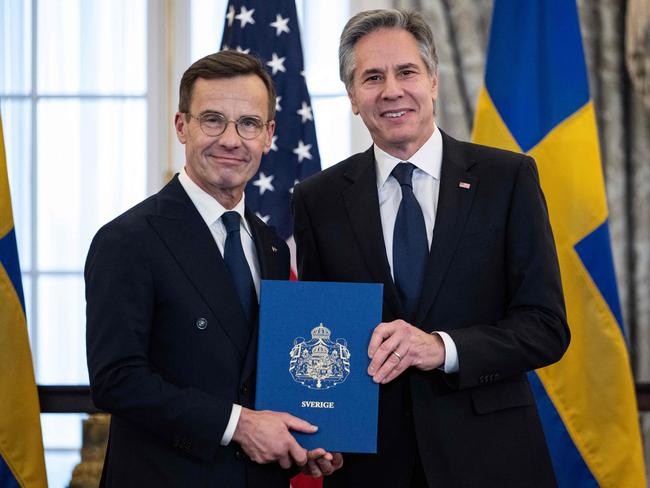
He later delivered a televised address to the nation from Washington, telling Swedes: “We are a small country, but we understand more than most the importance of the greater world beyond our borders.”
President Joe Biden, whose rival Donald Trump has disparaged NATO as unfairly burdening the United States, said in a statement that the alliance was stronger and “more united, determined and dynamic than ever” with Sweden.
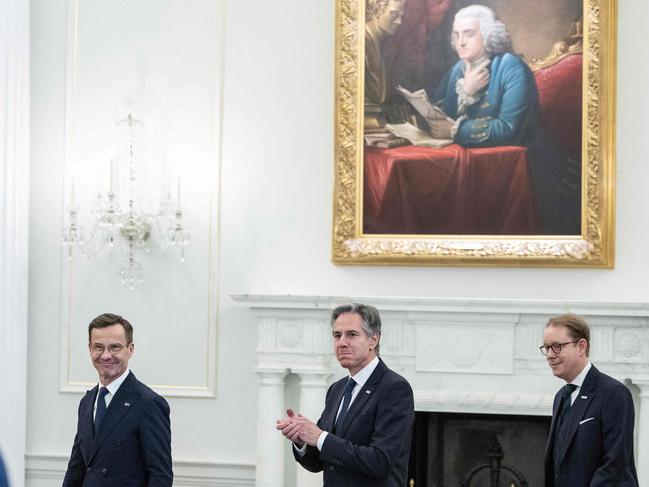
The Swedish prime minister was due to attend the annual State of the Union address by Mr Biden, who has been struggling to persuade Trump’s Republican Party to approve new aid to Ukraine.
Secretary of State Antony Blinken said few would have expected Sweden as well as Finland to join NATO before Russian President Vladimir Putin ordered the invasion of Ukraine in February 2022.
There is “no clearer example than today of the strategic debacle that Putin’s invasion of Ukraine has become for Russia,” Mr Blinken said.
Ukrainian President Volodymyr Zelenskyy also hailed Sweden’s membership, saying: “One more country in Europe has become more protected from Russian evil.”
Sweden has not fought in a war since the Napoleonic conflicts of the early 19th century.
Sweden and Finland, while militarily intertwined with the United States and both members of the European Union, had historically steered clear of joining NATO, formed in the Cold War to unite against the Soviet Union.
Finland and Sweden launched a joint bid quickly after the invasion of Ukraine, which itself had unsuccessfully sought to join NATO – an alliance that under Article 5, considers an attack on one member an attack on all.
Finland successfully joined in April 2023, but Sweden’s membership was stalled by Turkey.
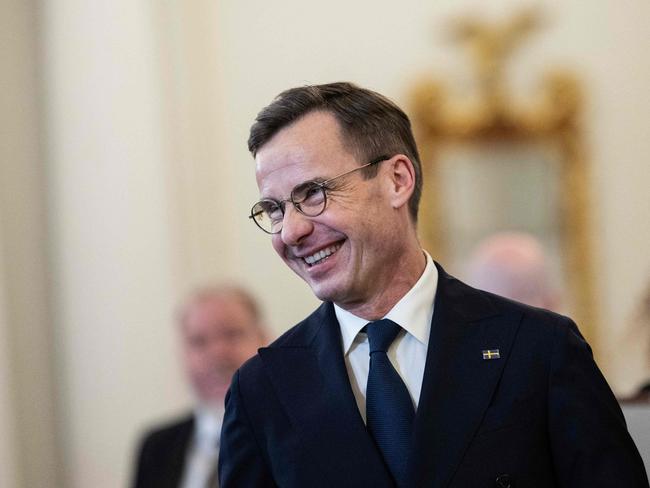
UKRAINE GETS ‘VAMPIRE DRONES’
Ukraine has employed the use of terrifying “vampire drones” to fight back against Vladimir Putin’s army.
The remote-controlled weapons are one of the war-torn nation’s only hopes after the country was hit with a shell shortage, reports The Sun.
Kitted out with improvised bombs, these killer machines are so feared by Russian troops they have been dubbed “Baba Yaga”, which is a child-eating witch from local legend.
They are part and parcel of modern warfare, fought remotely, much like a video game, and plugging the gaps in Ukraine’s firepower on the 965km front line.
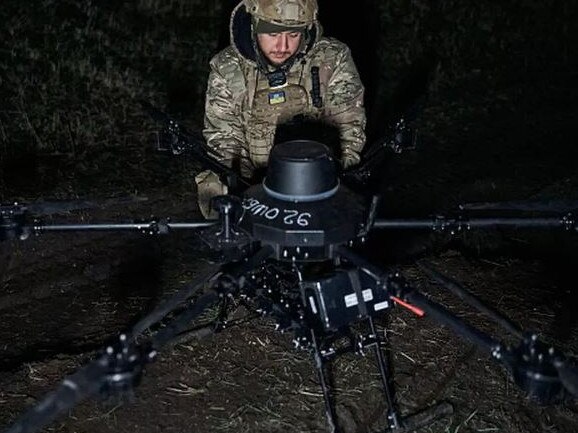
Cheap, deadly and easy to use, drones have let both sides blast targets behind the front lines at a fraction of the price of air-launched bombs and guided missiles.
Ukraine has vowed to build a million UAVs this year in recognition of their war-winning role.
One group of drone bombers hide out in an abandoned farm along Ukraine’s northeastern front, which has been turned into a temporary airfield. A six-metre antenna has been set up there while a Starlink satellite internet terminal ensures they are able to establish a speedy connection with the weapons.
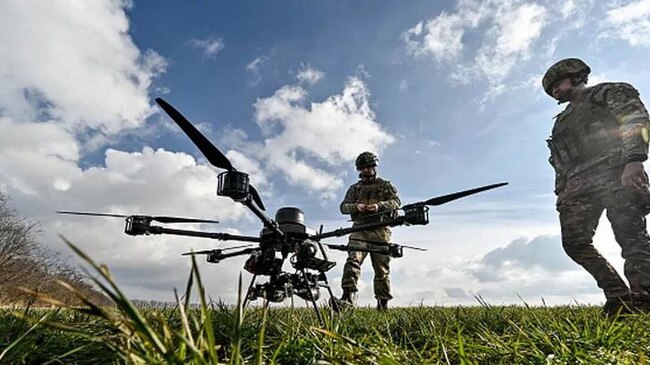
According to The Sun’s exclusive report, the team’s leader – Artem, 40 – has set up the Vampire’s controls in a cellar which now operates as a command bunker. Meanwhile his colleagues Maksim, 31, and Andrii, 36, built the bombs in the farmhouse out of gaffer tape, glue and cable ties.
Artem and his squad are targeting Russian forces in Kupiansk, an area the Kremlin has been trying to retake for several months. After Ukraine suffered a shortage of artillery shells, it was beginning to look like Putin’s forces might gain on the territory.
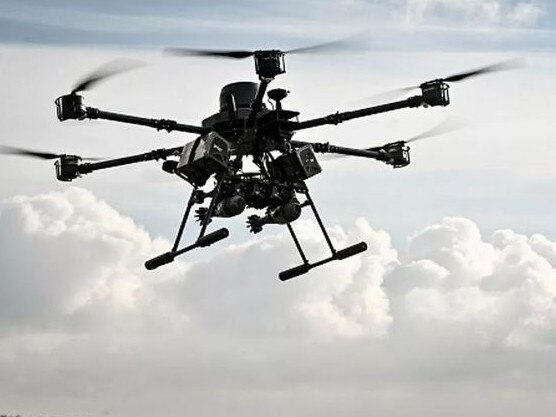
“We are rationing our artillery, so we can’t kill as many Russians. We can’t hold as many positions. But luckily the drone teams have really learned how to close the gaps on the front line,” Lieutenant Ivan, 43, told The Sun.
Ukraine has now pledged to build a million unmanned aerial vehicles (UAVs) this year. They are both cheap and easy to use, making them one of the country’s most effective and deadly resources.
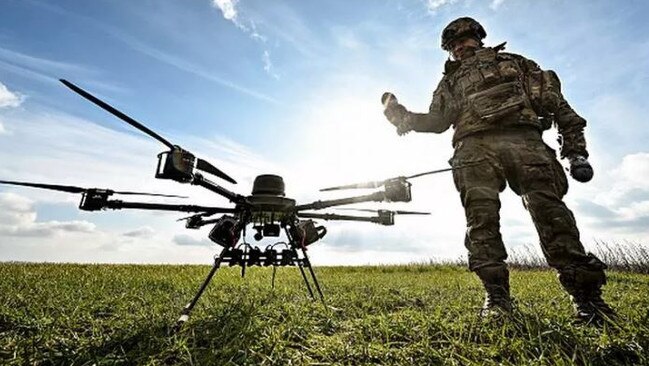
The six-engined Vampires cost less than a second-hand car and the cash to build them is crowd-funded by Ukraine’s Army of Drones initiative. They are roughly the size of a coffee table and complete an average of 50 flights before they are either destroyed or break.
Meanwhile the bombs they carry are a mix of antitank grenades and 3D printed mortars filled with shrapnel and explosives.
NAVALNY’S WIDOW CALLS FOR DAY OF ACTION
Alexei Navalny’s widow has called on Russians to flock to polling stations on the day of the general election to protest against President Vladimir Putin.
Yulia Navalnaya has pledged to continue her husband’s work and opposition to the Kremlin following his shock death last month in an Arctic prison colony.
On February 16, Russian authorities said Mr Navalny died suddenly in prison, but his supporters say the 47-year-old was murdered, possibly with the Novichok nerve agent.
In a new YouTube video, Ms Navalnaya backed an initiative to try to overload polling stations in this month’s nationwide vote that will see Mr Putin secure another six-year term as president.
“We need to use the election day to show that we are here, and we are many,” Ms Navalnaya said.
“We need to go to the polling station on one day at one time: 17 March at 12:00. What to do next? You can choose. You can vote for any candidate except Putin. You can spoil your ballot. You can write ‘Navalny’ in big letters.”
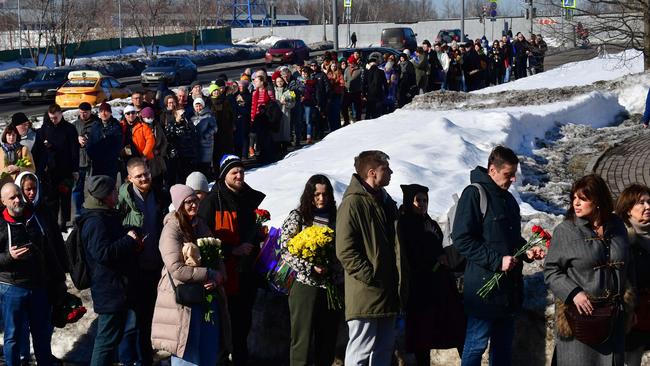
She called the upcoming presidential contest a “sham” and said Mr Putin would “draw up any result he wants,” but that a visual show of opposition on polling day could scare the Kremlin.
Mr Navalny himself had also backed the proposal, which organisers have called “midday against Putin”, in one of his final posts from jail before he died.
Backers of the initiative hope it will be a legal and safe way for Russians to protest against the Kremlin.
Anti-government street rallies and demonstrations are effectively illegal in Russia, and organisers and participants can be sentenced to years in prison.
Ms Navalnaya also said she had taken hope from pictures of thousands streaming down the streets to visit her husband’s grave with flowers and tributes since his burial last Friday.
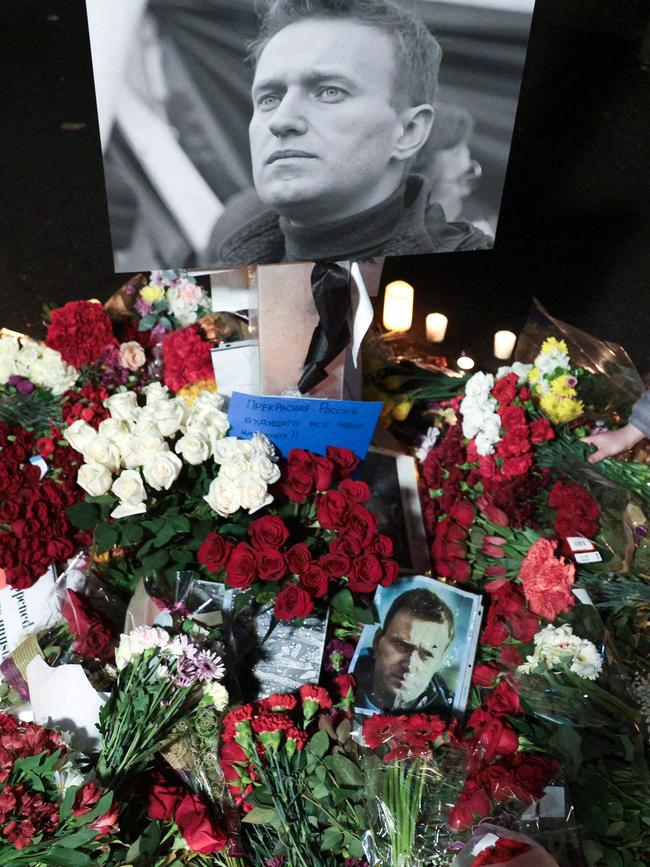
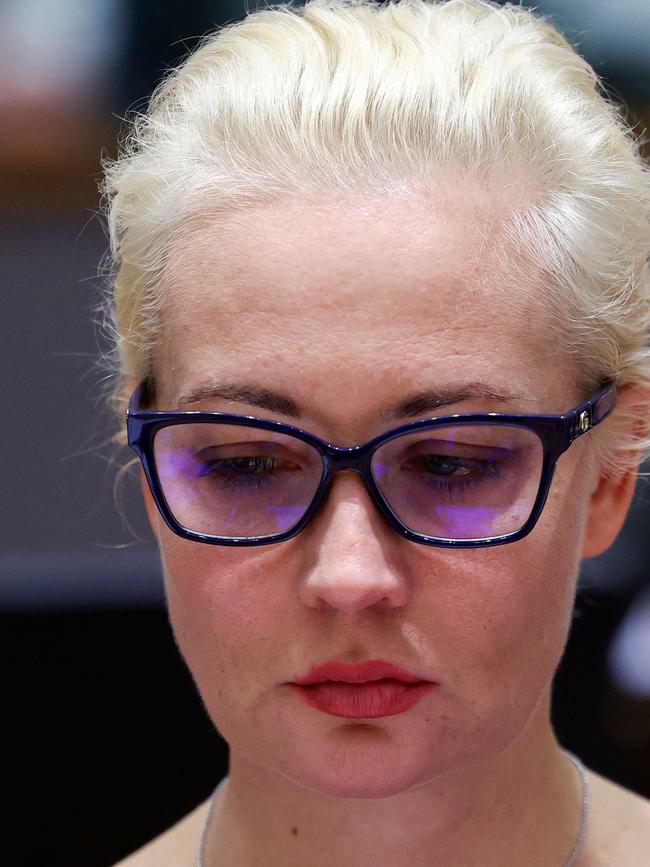
She, her two children and Mr Navalny’s brother all live abroad and did not attend the service, where they could have been arrested for their own opposition to Mr Putin.
Calling her late husband’s supporters the “bravest, most honest people in our country”, she said the show of support proved there was significant opposition to the Kremlin inside Russia.
“We are many and we are strong,” she said.
“These days I saw so much warmth, kindness and unity. It’s exactly that which separates us from the people sitting in the Kremlin. They have a cult of the past, war, missiles and vile murders. And we have mutual love, support and faith in the future,” she said.
Despite the Kremlin threatening to arrest mourners, long queues formed over the weekend outside the Borisovo cemetery in southern Moscow where Navalny was buried.
Supporters covered his grave in stacks of red, white and yellow carnations and roses.
NAVALNY PREDICTED HIS DEATH WOULD CHANGE ‘NOTHING’
In an unpublished testimony in 2020 and released this week, Mr Navalny predicted that his death would change “nothing” and other people would stand in his place.
“If they would kill me it changes nothing,” Mr Navalny told Jacques Maire, then a member of the Parliamentary Assembly of the Council of Europe, in December 2020, speaking in English.
In the testimony released by French daily Liberation and broadcaster LCI, Mr Navalny said his team knew what to do without him, although he admitted things would be more “difficult”.
“There are other people who are ready to stand (in) my place,” he said.
“There are millions of people who don’t want to live in a country where the whole power is just in one (man’s) hands.
“It’s not about me. It’s about people who I represent or (am) trying to represent.”
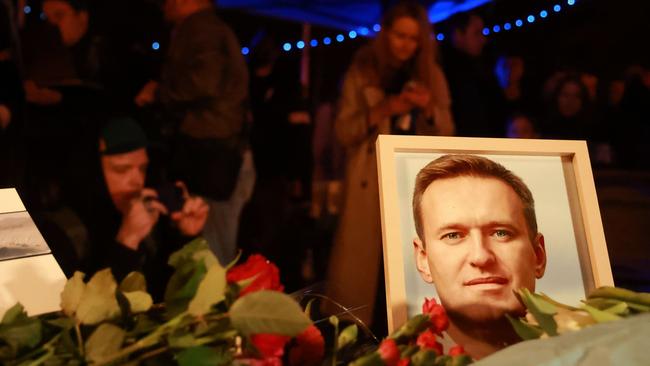
He also said the Kremlin had “never” tried to negotiate with him, adding that the Russian authorities considered him to be “radical”.
Maire released the videotaped testimony with the agreement of the Parliamentary Assembly of the Council of Europe.
Mr Navalny was interviewed by Maire on December 17, 2020 in Berlin, ahead of his return to Russia following treatment for Novichok poisoning he blamed on the Kremlin.
Upon returning to Russia in January 2021 he was arrested at the airport and jailed.
Maire also asked Mr Navalny what would happen to his movement if he did not come back.
“They know how to operate without me because actually I spent a lot of time every year in prison so they are accustomed to work without me,” Mr Navalny said of his team.
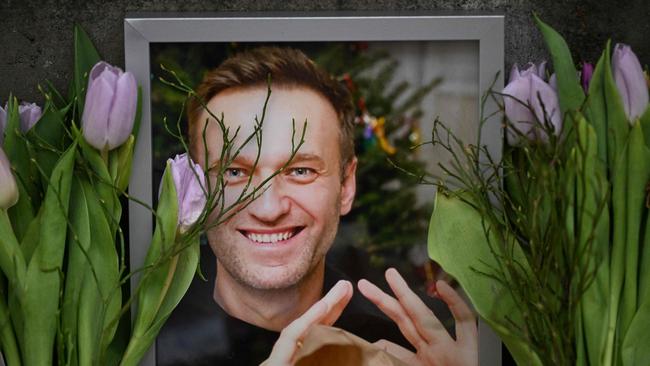
“The organisation will sustain and will operate but of course it would be more difficult in terms of morale and motivation,” Navalny said.
“There (are) some other people who can lead.” Navalny’s wife Yulia has said she will continue her husband’s cause.
Navalny said “at least half of the country want Russia to be a normal European country” and accused President Vladimir Putin of wanting to crush “this type of thoughts and political movements”.
Mr Navalny said the Russian authorities used poison against Kremlin critics because “it’s terrifying.” “C’mon, even here in Europe. Now I talk to people and some European politicians say … ‘I just don’t want to mess with this’.”
“People are afraid of such mysterious deaths. I think that’s the main goal. And Putin personally enjoys the idea that people are afraid of his dark power.”
In his testimony, Mr Navalny drew parallels to the role of Saudi authorities in the 2018 murder of Saudi journalist Jamal Khashoggi in Turkey.
“Everyone knows who ordered the killing of Khashoggi,” he said.
‘COWARDS’: MACRON SLAMS UKRAINE ALLIES
French President Emmanuel Macron has urged Ukraine’s allies not to be “cowards” in supporting the country to fight off the Russian invasion.
Additionally, Macron said that he “fully stood behind” controversial remarks made last week not ruling out sending Western troops to Ukraine, which sent a shockwave around Europe.
“We are surely approaching a moment for Europe in which it will be necessary not to be cowards,” Macron said on a visit to the Czech Republic, which is pushing a plan to buy weapons outside Europe for Ukraine.
Speaking after meeting his Czech counterpart Petr Pavel, he asked: “Is this or is it not our war? Can we look away in the belief that we can let things run their course?”
“I don’t believe so, and therefore I called for a strategic surge and I fully stand behind that,” Macron said.
But not all EU leaders feel reassured by Macron’s gung-ho attitude.
German Defence Minister Boris Pistorius said that Macron’s call for Ukraine’s allies “not to be cowards” is not helping.
“We don’t need really, from my perspective at least, discussions about boots on the ground or having more courage or less courage,” Mr Pistorius told reporters.
“This is something which does not really help solve the issues we have when it comes to helping Ukraine,” he added.
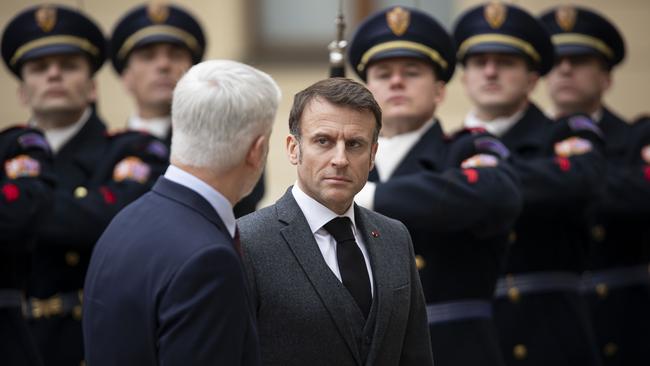
Most of Macron’s European allies said they would not send troops to Ukraine after his comments on February 26.
French officials also insisted any such forces could be sent to back operations such as de-mining rather than fighting Russian forces.
Mr Macron was later to meet Czech Prime Minister Petr Fiala and address a nuclear forum.
The Financial Times said Prague was looking to amass $US1.5bn ($A2.3bn) to pay for the munitions for Ukraine, which has been battling the Russian invasion for two years.
Fiala said at an international conference in Paris last week that around 15 nations, including France, were ready to join the initiative.
Mr Macron reiterated that France backed the plan but did not say how much it might contribute. The Netherlands has already pledged to donate 100m euros ($A167m).
A French adviser said the Prague visit would be an opportunity to “discuss this initiative” and come up with further specifications.
Macron also threw his weight behind using revenues from frozen Russian assets in Europe to fund Ukraine’s defence.
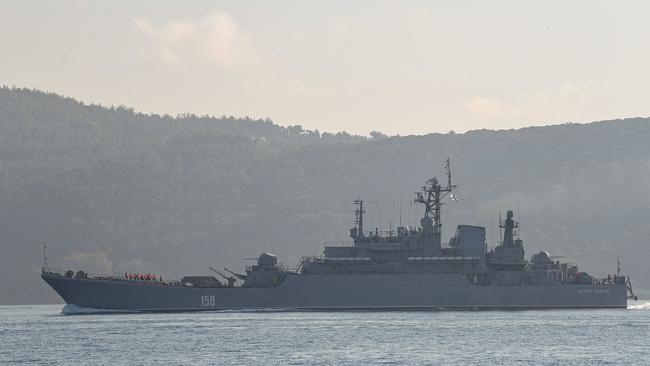
UKRAINE DESTROYS SECOND RUSSIAN WARSHIP
Ukraine said its forces destroyed a Russian military patrol ship in the Black Sea near annexed Crimea, the latest naval attack on Moscow’s fleet in the key waterway.
Kyiv also said it was behind a drone strike on an oil depot in a Russian border region.
Ukraine is flexing its ability to strike Russia from the air and at sea while its troops struggle on the front lines.
The Black Sea has been a vital battleground in the two-year war.
Ukraine claims to have destroyed more than two dozen Russian ships since Moscow invaded in February 2022.
Ukraine’s GUR military intelligence unit on Tuesday released a black and white video of what it said was the overnight attack on the Sergei Kotov, a 94-metre (308-foot) Russian military patrol ship.
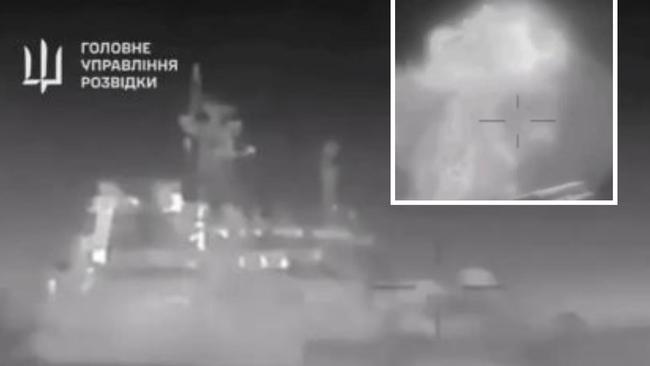
The footage showed a naval drone approaching the side of the vessel, before a large explosion can be seen sending fire, smoke and debris into the sky.
“Another very successful operation. Great news,” said GUR spokesman Andriy Yusov.
The attack happened near the Kerch Strait, off the Crimean peninsula, which Moscow unilaterally annexed in 2014.
Officials in Kyiv revelled in the hit, a much-needed boost for Ukrainian forces at a time when Russia is in the ascendancy on the battlefield.
“One Russian ship has been upgraded to a submarine,” Ukraine’s defence ministry said in an ironic post on X.
Kyiv says it has disabled at least 25 Russian vessels since Moscow invaded — more than a third of its pre-war Black Sea fleet.
“Russia’s Black Sea Fleet is a symbol of occupation. It cannot be in Ukrainian Crimea,” the Ukrainian president’s chief of staff, Andriy Yermak, said on Tuesday.
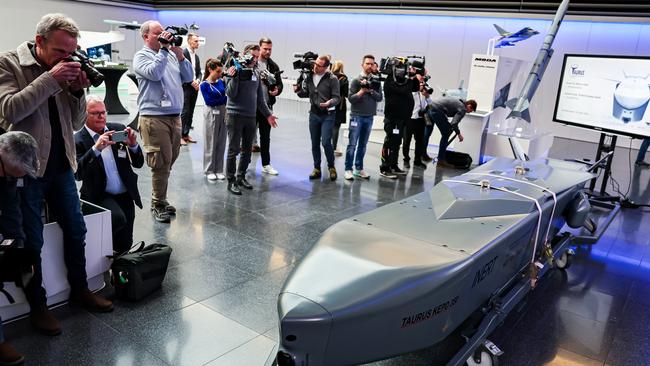
‘INDIVIDUAL ERROR’ BEHIND GERMAN LEAKED AUDIO
Germany seeks to downplay an audio leak of senior military personnel discussing the war in Ukraine, blaming “individual error” and stressing that Berlin still had the trust of allies.
A 38-minute recording of the talks, in which the officers debated the possible use of German-made Taurus missiles by Ukraine, was posted Friday on Russian social media.
“A serious mistake happened here that should not have happened,” Defence Minister Boris Pistorius told a press conference.
The initial results of a probe showed the German army’s “communications systems are not and were not compromised”, the minister said.
“The reason the phone call could still be recorded … is due to an individual user error,” he said.
Mr Pistorius said he had telephoned allies over the leak and was reassured that their “trust in Germany is unbroken”.
“Everyone knows about the danger of such wire-tapping attacks and knows that no one can offer 100-percent protection.”
Kyiv has been calling on Germany to provide it with Taurus missiles, which can reach targets up to 500km away.
Chancellor Olaf Scholz has however declined to approve the deliveries, fearing it could draw Germany into the war.
In the recording, Bundeswehr officers can be heard discussing various details about the possible use of Taurus missiles, including specific quantities.
The participants speculate whether they could be used to hit a key bridge over the Kerch strait linking the Russian mainland to Crimea, annexed by Moscow in 2014.
The conversation also touched on long-range missiles supplied to Ukraine by France and Britain with references to British soldiers on the ground.
The Kremlin said that the content of the recording proved Western countries were participating in the conflict in Ukraine.
ARREST WARRANTS ISSUED FOR RUSSIAN OFFICIALS
The International Criminal Court said Tuesday that it has issued arrest warrants for two senior Russian officers over the Ukraine war, including strikes targeting Ukrainian power infrastructure.
The move comes after the court targeted Russian President Vladimir Putin in March last year with an international arrest warrant on warm crime accusations over the deportation of Ukrainian children since launching the war in February 2022.
It named the two new warrant targets as Sergei Ivanovich Kobylash and Viktor Nikolayevich Sokolov, an army lieutenant general and a navy admiral, and said the suspected crimes were committed between October 2022 and March 2023.
The two men “are each allegedly responsible for the war crime of directing attacks at civilian” targets and are also accused of the “crime against humanity of inhumane acts”, the court said.
The court said there were grounds to believe that the two suspects were responsible for missile strikes against Ukrainian electric infrastructure from at least October 10, 2022, until at least March 9, 2023.
.@IntlCrimCourt issues arrest warrants for top #Russian commanders Sergei Ivanovich Kobylash and Viktor Nikolayevich Sokolov over alleged war crimes in #Ukrainehttps://t.co/r3GSuE4Wltpic.twitter.com/c4rVDJZWHT
— Arab News (@arabnews) March 5, 2024
Over this time, there was an alleged campaign of strikes against electric power plants and substations that were carried out by the Russian armed forces in multiple locations in Ukraine, the court said.
“There are reasonable grounds to believe they bear individual criminal responsibility for the aforementioned crimes,” the Hague-based court said in a statement.
The two men either carried out the attacks directly or ordered them, or failed “to exercise proper control over the forces under their command”, it said.
– with AFP
More Coverage
Read related topics:Russia & Ukraine Conflict




